UKCBC - Entrepreneurship and Small Business Management Report
VerifiedAdded on 2023/01/20
|16
|4319
|73
Report
AI Summary
This report provides an overview of entrepreneurship and small business management, focusing on different types of entrepreneurial ventures, their similarities and differences, and their impact on the UK economy. It differentiates between entrepreneurs and intrapreneurs, examines private, public, and social enterprises, and analyzes the influence of micro and small businesses on market share and job creation. The report also discusses the importance of small and startup companies in enhancing the social economy through technological innovation and awareness creation. Furthermore, it outlines the characteristics and skills of successful entrepreneurs, distinguishing them from managers, and explores entrepreneurial personality traits and mindset. The study concludes by highlighting the crucial role of entrepreneurs in driving economic growth and improving the standard of living.
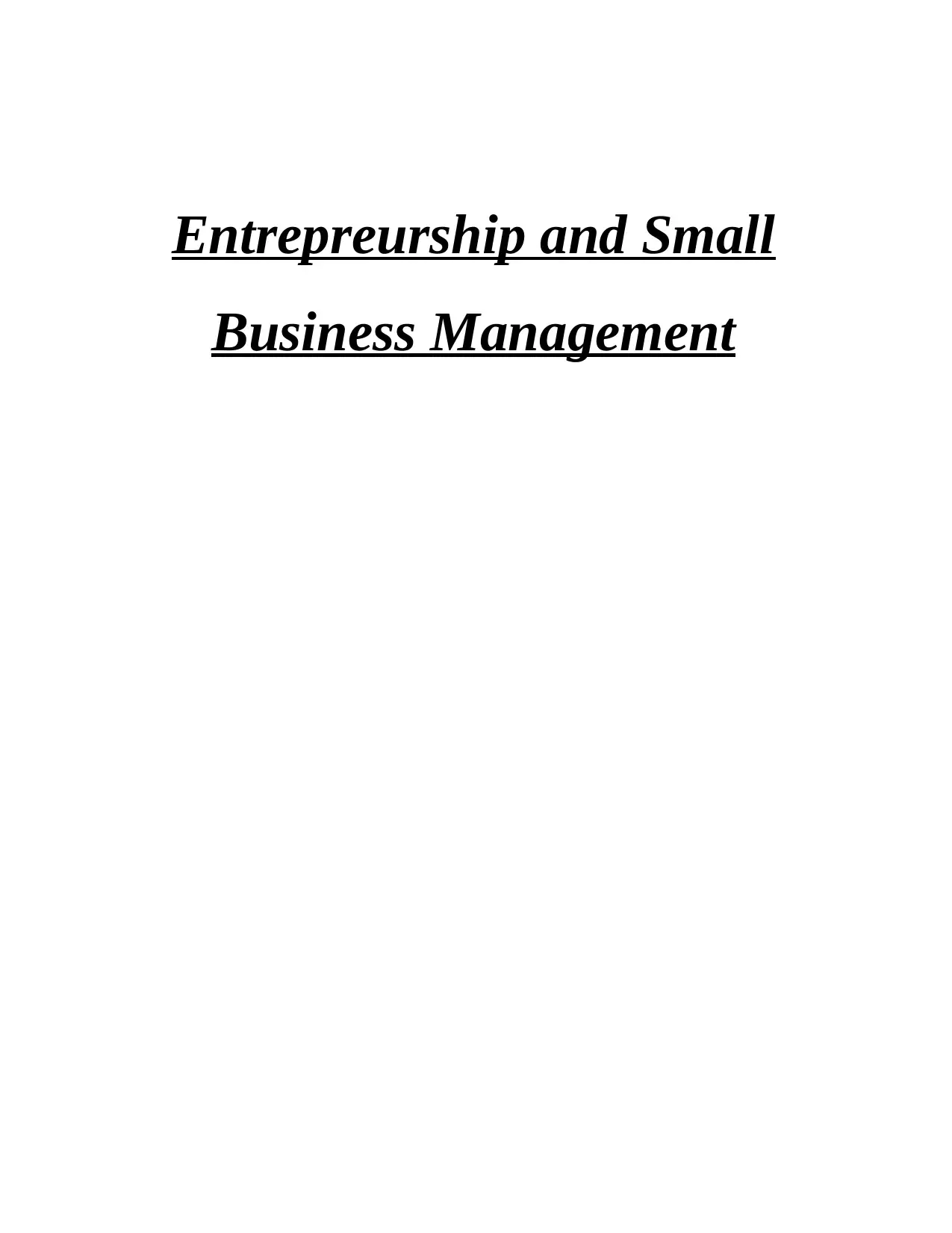
Entrepreurship and Small
Business Management
Business Management
Paraphrase This Document
Need a fresh take? Get an instant paraphrase of this document with our AI Paraphraser
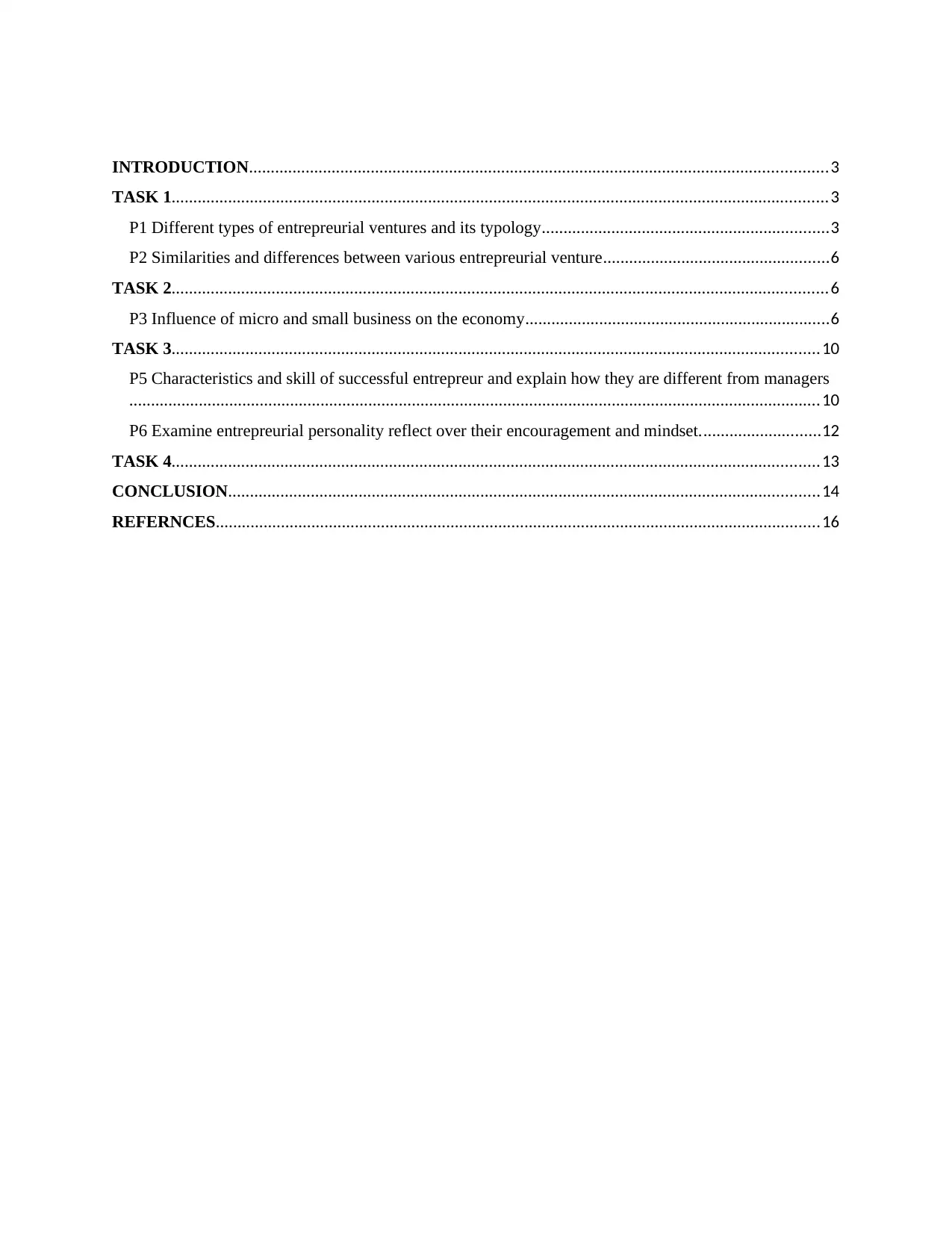
INTRODUCTION.....................................................................................................................................3
TASK 1.......................................................................................................................................................3
P1 Different types of entrepreurial ventures and its typology..................................................................3
P2 Similarities and differences between various entrepreurial venture....................................................6
TASK 2.......................................................................................................................................................6
P3 Influence of micro and small business on the economy......................................................................6
TASK 3.....................................................................................................................................................10
P5 Characteristics and skill of successful entrepreur and explain how they are different from managers
...............................................................................................................................................................10
P6 Examine entrepreurial personality reflect over their encouragement and mindset............................12
TASK 4.....................................................................................................................................................13
CONCLUSION........................................................................................................................................14
REFERNCES...........................................................................................................................................16
TASK 1.......................................................................................................................................................3
P1 Different types of entrepreurial ventures and its typology..................................................................3
P2 Similarities and differences between various entrepreurial venture....................................................6
TASK 2.......................................................................................................................................................6
P3 Influence of micro and small business on the economy......................................................................6
TASK 3.....................................................................................................................................................10
P5 Characteristics and skill of successful entrepreur and explain how they are different from managers
...............................................................................................................................................................10
P6 Examine entrepreurial personality reflect over their encouragement and mindset............................12
TASK 4.....................................................................................................................................................13
CONCLUSION........................................................................................................................................14
REFERNCES...........................................................................................................................................16
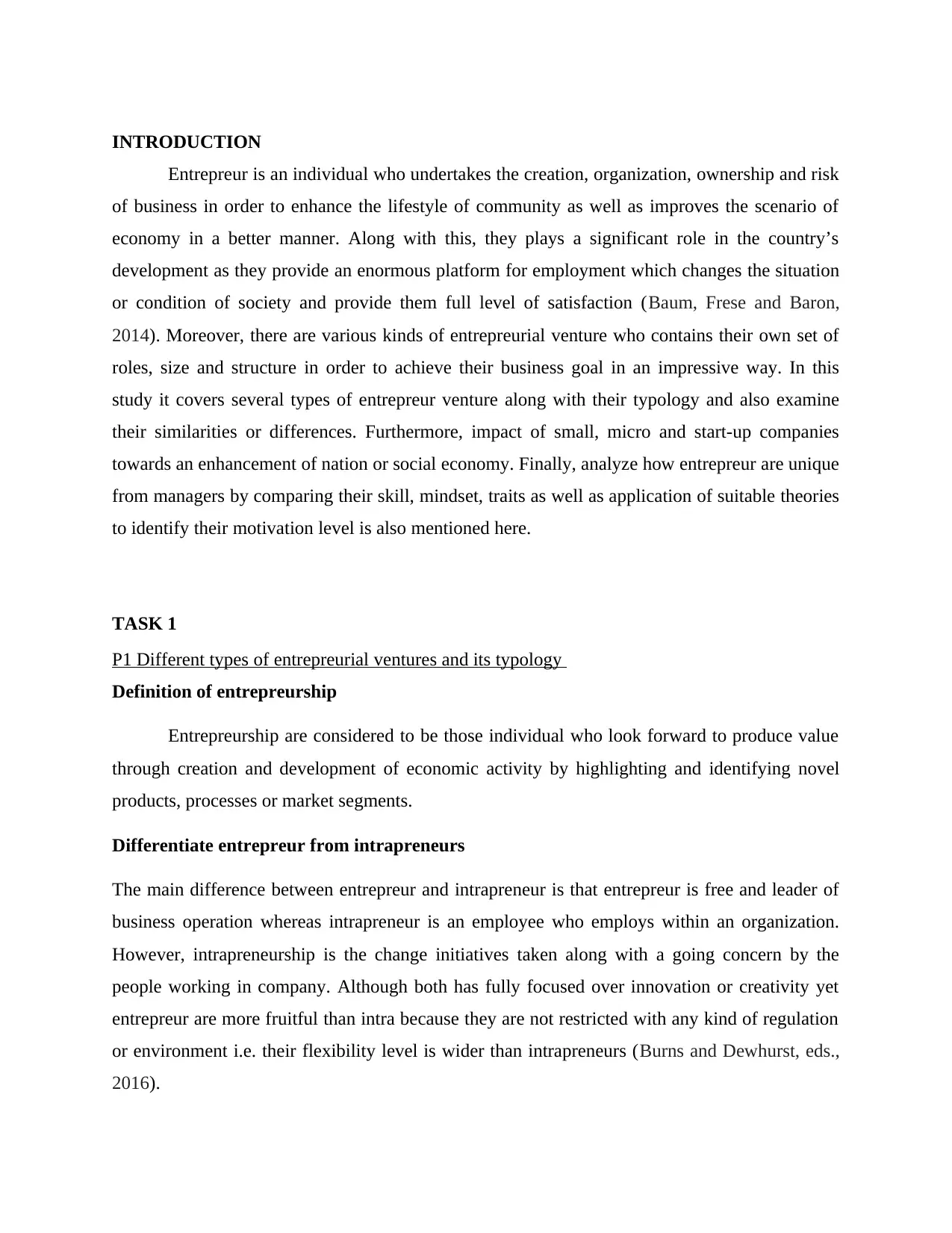
INTRODUCTION
Entrepreur is an individual who undertakes the creation, organization, ownership and risk
of business in order to enhance the lifestyle of community as well as improves the scenario of
economy in a better manner. Along with this, they plays a significant role in the country’s
development as they provide an enormous platform for employment which changes the situation
or condition of society and provide them full level of satisfaction (Baum, Frese and Baron,
2014). Moreover, there are various kinds of entrepreurial venture who contains their own set of
roles, size and structure in order to achieve their business goal in an impressive way. In this
study it covers several types of entrepreur venture along with their typology and also examine
their similarities or differences. Furthermore, impact of small, micro and start-up companies
towards an enhancement of nation or social economy. Finally, analyze how entrepreur are unique
from managers by comparing their skill, mindset, traits as well as application of suitable theories
to identify their motivation level is also mentioned here.
TASK 1
P1 Different types of entrepreurial ventures and its typology
Definition of entrepreurship
Entrepreurship are considered to be those individual who look forward to produce value
through creation and development of economic activity by highlighting and identifying novel
products, processes or market segments.
Differentiate entrepreur from intrapreneurs
The main difference between entrepreur and intrapreneur is that entrepreur is free and leader of
business operation whereas intrapreneur is an employee who employs within an organization.
However, intrapreneurship is the change initiatives taken along with a going concern by the
people working in company. Although both has fully focused over innovation or creativity yet
entrepreur are more fruitful than intra because they are not restricted with any kind of regulation
or environment i.e. their flexibility level is wider than intrapreneurs (Burns and Dewhurst, eds.,
2016).
Entrepreur is an individual who undertakes the creation, organization, ownership and risk
of business in order to enhance the lifestyle of community as well as improves the scenario of
economy in a better manner. Along with this, they plays a significant role in the country’s
development as they provide an enormous platform for employment which changes the situation
or condition of society and provide them full level of satisfaction (Baum, Frese and Baron,
2014). Moreover, there are various kinds of entrepreurial venture who contains their own set of
roles, size and structure in order to achieve their business goal in an impressive way. In this
study it covers several types of entrepreur venture along with their typology and also examine
their similarities or differences. Furthermore, impact of small, micro and start-up companies
towards an enhancement of nation or social economy. Finally, analyze how entrepreur are unique
from managers by comparing their skill, mindset, traits as well as application of suitable theories
to identify their motivation level is also mentioned here.
TASK 1
P1 Different types of entrepreurial ventures and its typology
Definition of entrepreurship
Entrepreurship are considered to be those individual who look forward to produce value
through creation and development of economic activity by highlighting and identifying novel
products, processes or market segments.
Differentiate entrepreur from intrapreneurs
The main difference between entrepreur and intrapreneur is that entrepreur is free and leader of
business operation whereas intrapreneur is an employee who employs within an organization.
However, intrapreneurship is the change initiatives taken along with a going concern by the
people working in company. Although both has fully focused over innovation or creativity yet
entrepreur are more fruitful than intra because they are not restricted with any kind of regulation
or environment i.e. their flexibility level is wider than intrapreneurs (Burns and Dewhurst, eds.,
2016).
⊘ This is a preview!⊘
Do you want full access?
Subscribe today to unlock all pages.

Trusted by 1+ million students worldwide
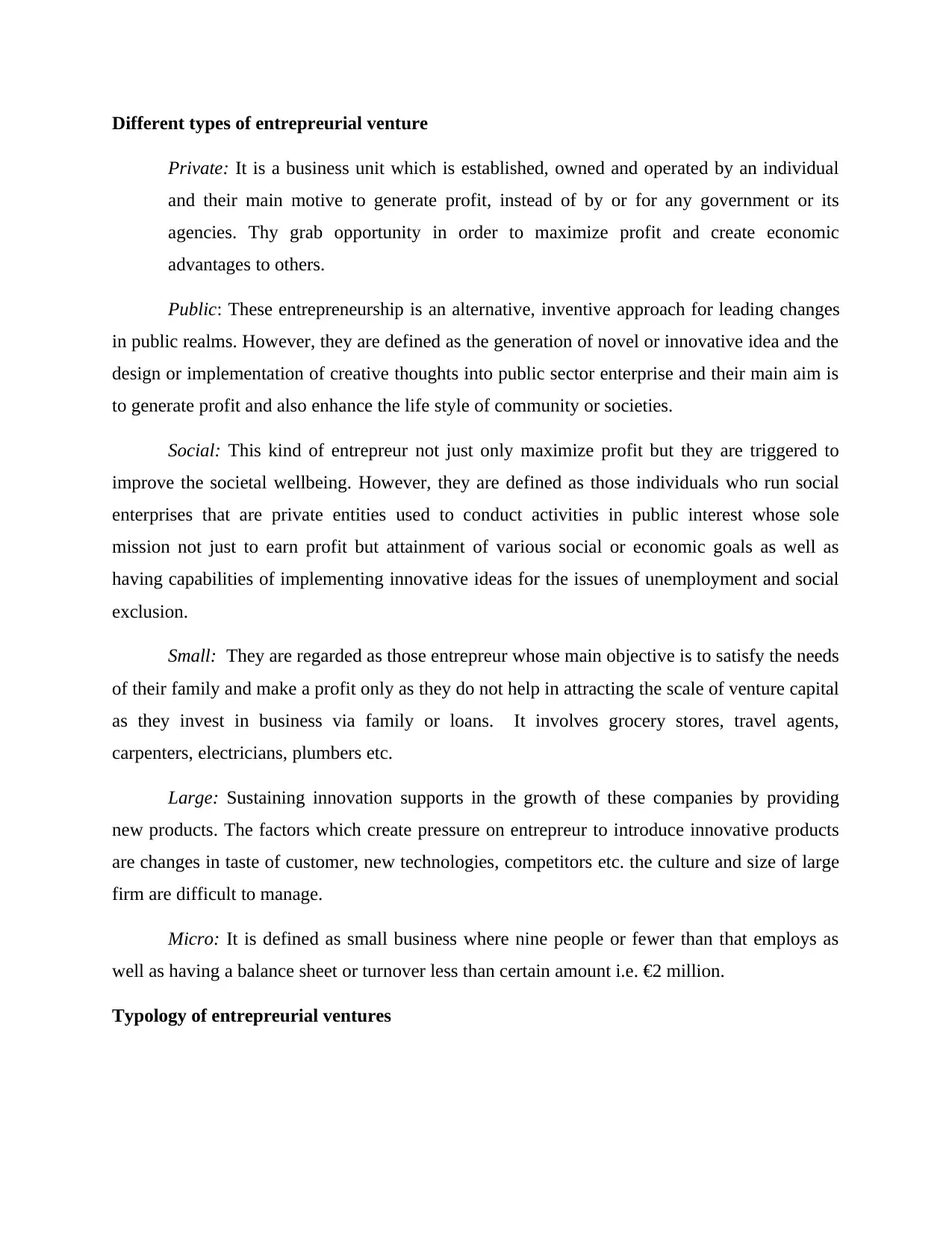
Different types of entrepreurial venture
Private: It is a business unit which is established, owned and operated by an individual
and their main motive to generate profit, instead of by or for any government or its
agencies. Thy grab opportunity in order to maximize profit and create economic
advantages to others.
Public: These entrepreneurship is an alternative, inventive approach for leading changes
in public realms. However, they are defined as the generation of novel or innovative idea and the
design or implementation of creative thoughts into public sector enterprise and their main aim is
to generate profit and also enhance the life style of community or societies.
Social: This kind of entrepreur not just only maximize profit but they are triggered to
improve the societal wellbeing. However, they are defined as those individuals who run social
enterprises that are private entities used to conduct activities in public interest whose sole
mission not just to earn profit but attainment of various social or economic goals as well as
having capabilities of implementing innovative ideas for the issues of unemployment and social
exclusion.
Small: They are regarded as those entrepreur whose main objective is to satisfy the needs
of their family and make a profit only as they do not help in attracting the scale of venture capital
as they invest in business via family or loans. It involves grocery stores, travel agents,
carpenters, electricians, plumbers etc.
Large: Sustaining innovation supports in the growth of these companies by providing
new products. The factors which create pressure on entrepreur to introduce innovative products
are changes in taste of customer, new technologies, competitors etc. the culture and size of large
firm are difficult to manage.
Micro: It is defined as small business where nine people or fewer than that employs as
well as having a balance sheet or turnover less than certain amount i.e. €2 million.
Typology of entrepreurial ventures
Private: It is a business unit which is established, owned and operated by an individual
and their main motive to generate profit, instead of by or for any government or its
agencies. Thy grab opportunity in order to maximize profit and create economic
advantages to others.
Public: These entrepreneurship is an alternative, inventive approach for leading changes
in public realms. However, they are defined as the generation of novel or innovative idea and the
design or implementation of creative thoughts into public sector enterprise and their main aim is
to generate profit and also enhance the life style of community or societies.
Social: This kind of entrepreur not just only maximize profit but they are triggered to
improve the societal wellbeing. However, they are defined as those individuals who run social
enterprises that are private entities used to conduct activities in public interest whose sole
mission not just to earn profit but attainment of various social or economic goals as well as
having capabilities of implementing innovative ideas for the issues of unemployment and social
exclusion.
Small: They are regarded as those entrepreur whose main objective is to satisfy the needs
of their family and make a profit only as they do not help in attracting the scale of venture capital
as they invest in business via family or loans. It involves grocery stores, travel agents,
carpenters, electricians, plumbers etc.
Large: Sustaining innovation supports in the growth of these companies by providing
new products. The factors which create pressure on entrepreur to introduce innovative products
are changes in taste of customer, new technologies, competitors etc. the culture and size of large
firm are difficult to manage.
Micro: It is defined as small business where nine people or fewer than that employs as
well as having a balance sheet or turnover less than certain amount i.e. €2 million.
Typology of entrepreurial ventures
Paraphrase This Document
Need a fresh take? Get an instant paraphrase of this document with our AI Paraphraser
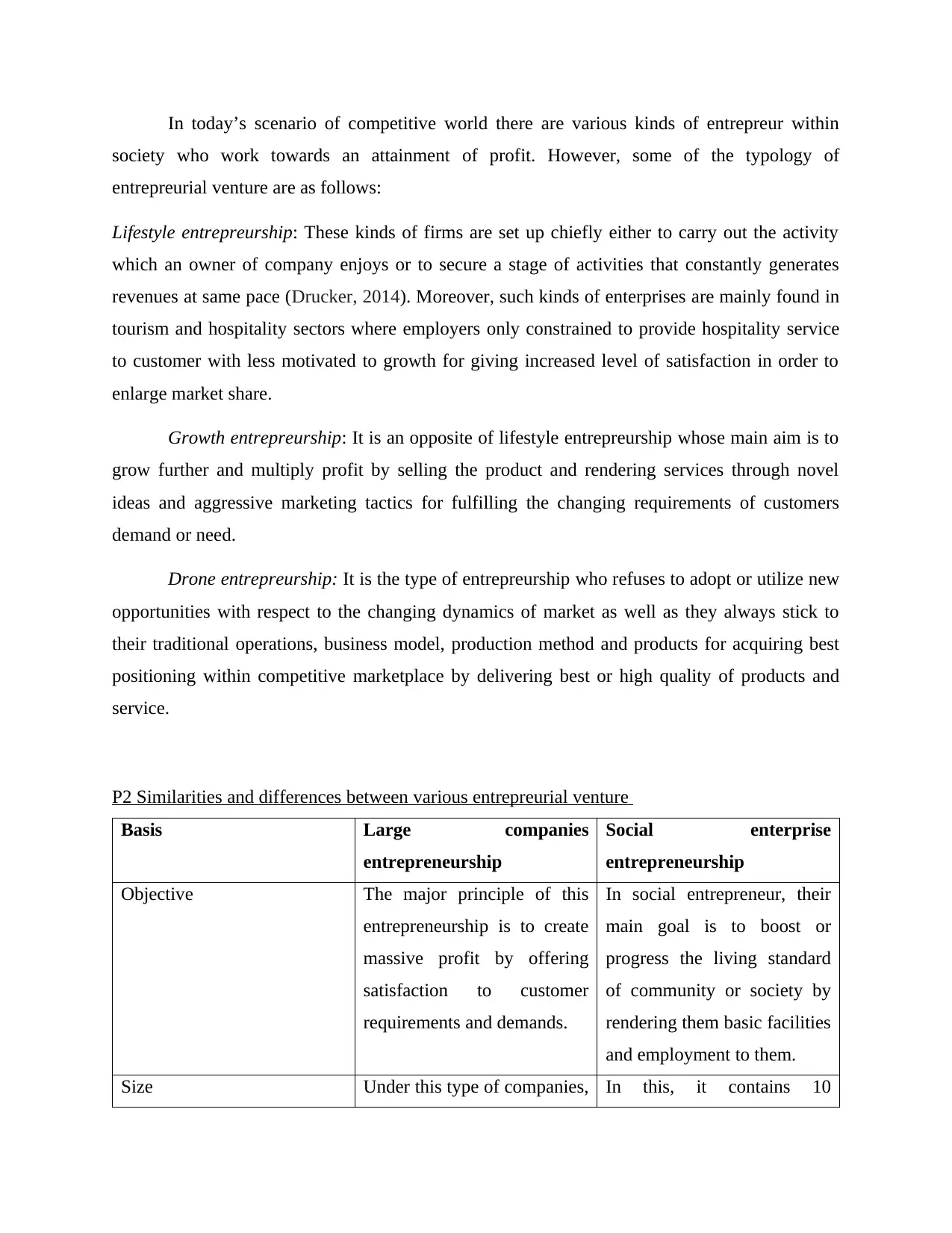
In today’s scenario of competitive world there are various kinds of entrepreur within
society who work towards an attainment of profit. However, some of the typology of
entrepreurial venture are as follows:
Lifestyle entrepreurship: These kinds of firms are set up chiefly either to carry out the activity
which an owner of company enjoys or to secure a stage of activities that constantly generates
revenues at same pace (Drucker, 2014). Moreover, such kinds of enterprises are mainly found in
tourism and hospitality sectors where employers only constrained to provide hospitality service
to customer with less motivated to growth for giving increased level of satisfaction in order to
enlarge market share.
Growth entrepreurship: It is an opposite of lifestyle entrepreurship whose main aim is to
grow further and multiply profit by selling the product and rendering services through novel
ideas and aggressive marketing tactics for fulfilling the changing requirements of customers
demand or need.
Drone entrepreurship: It is the type of entrepreurship who refuses to adopt or utilize new
opportunities with respect to the changing dynamics of market as well as they always stick to
their traditional operations, business model, production method and products for acquiring best
positioning within competitive marketplace by delivering best or high quality of products and
service.
P2 Similarities and differences between various entrepreurial venture
Basis Large companies
entrepreneurship
Social enterprise
entrepreneurship
Objective The major principle of this
entrepreneurship is to create
massive profit by offering
satisfaction to customer
requirements and demands.
In social entrepreneur, their
main goal is to boost or
progress the living standard
of community or society by
rendering them basic facilities
and employment to them.
Size Under this type of companies, In this, it contains 10
society who work towards an attainment of profit. However, some of the typology of
entrepreurial venture are as follows:
Lifestyle entrepreurship: These kinds of firms are set up chiefly either to carry out the activity
which an owner of company enjoys or to secure a stage of activities that constantly generates
revenues at same pace (Drucker, 2014). Moreover, such kinds of enterprises are mainly found in
tourism and hospitality sectors where employers only constrained to provide hospitality service
to customer with less motivated to growth for giving increased level of satisfaction in order to
enlarge market share.
Growth entrepreurship: It is an opposite of lifestyle entrepreurship whose main aim is to
grow further and multiply profit by selling the product and rendering services through novel
ideas and aggressive marketing tactics for fulfilling the changing requirements of customers
demand or need.
Drone entrepreurship: It is the type of entrepreurship who refuses to adopt or utilize new
opportunities with respect to the changing dynamics of market as well as they always stick to
their traditional operations, business model, production method and products for acquiring best
positioning within competitive marketplace by delivering best or high quality of products and
service.
P2 Similarities and differences between various entrepreurial venture
Basis Large companies
entrepreneurship
Social enterprise
entrepreneurship
Objective The major principle of this
entrepreneurship is to create
massive profit by offering
satisfaction to customer
requirements and demands.
In social entrepreneur, their
main goal is to boost or
progress the living standard
of community or society by
rendering them basic facilities
and employment to them.
Size Under this type of companies, In this, it contains 10
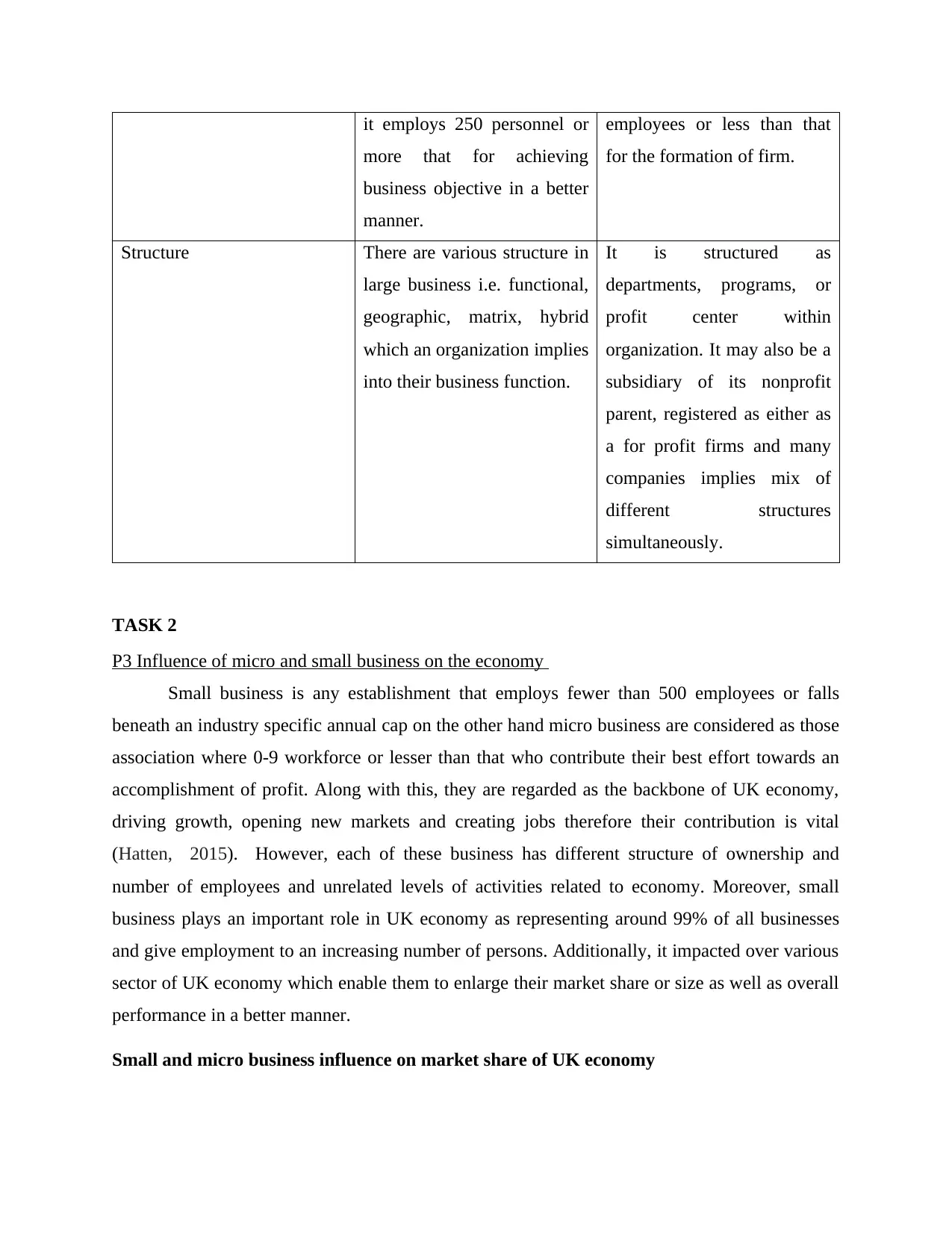
it employs 250 personnel or
more that for achieving
business objective in a better
manner.
employees or less than that
for the formation of firm.
Structure There are various structure in
large business i.e. functional,
geographic, matrix, hybrid
which an organization implies
into their business function.
It is structured as
departments, programs, or
profit center within
organization. It may also be a
subsidiary of its nonprofit
parent, registered as either as
a for profit firms and many
companies implies mix of
different structures
simultaneously.
TASK 2
P3 Influence of micro and small business on the economy
Small business is any establishment that employs fewer than 500 employees or falls
beneath an industry specific annual cap on the other hand micro business are considered as those
association where 0-9 workforce or lesser than that who contribute their best effort towards an
accomplishment of profit. Along with this, they are regarded as the backbone of UK economy,
driving growth, opening new markets and creating jobs therefore their contribution is vital
(Hatten, 2015). However, each of these business has different structure of ownership and
number of employees and unrelated levels of activities related to economy. Moreover, small
business plays an important role in UK economy as representing around 99% of all businesses
and give employment to an increasing number of persons. Additionally, it impacted over various
sector of UK economy which enable them to enlarge their market share or size as well as overall
performance in a better manner.
Small and micro business influence on market share of UK economy
more that for achieving
business objective in a better
manner.
employees or less than that
for the formation of firm.
Structure There are various structure in
large business i.e. functional,
geographic, matrix, hybrid
which an organization implies
into their business function.
It is structured as
departments, programs, or
profit center within
organization. It may also be a
subsidiary of its nonprofit
parent, registered as either as
a for profit firms and many
companies implies mix of
different structures
simultaneously.
TASK 2
P3 Influence of micro and small business on the economy
Small business is any establishment that employs fewer than 500 employees or falls
beneath an industry specific annual cap on the other hand micro business are considered as those
association where 0-9 workforce or lesser than that who contribute their best effort towards an
accomplishment of profit. Along with this, they are regarded as the backbone of UK economy,
driving growth, opening new markets and creating jobs therefore their contribution is vital
(Hatten, 2015). However, each of these business has different structure of ownership and
number of employees and unrelated levels of activities related to economy. Moreover, small
business plays an important role in UK economy as representing around 99% of all businesses
and give employment to an increasing number of persons. Additionally, it impacted over various
sector of UK economy which enable them to enlarge their market share or size as well as overall
performance in a better manner.
Small and micro business influence on market share of UK economy
⊘ This is a preview!⊘
Do you want full access?
Subscribe today to unlock all pages.

Trusted by 1+ million students worldwide
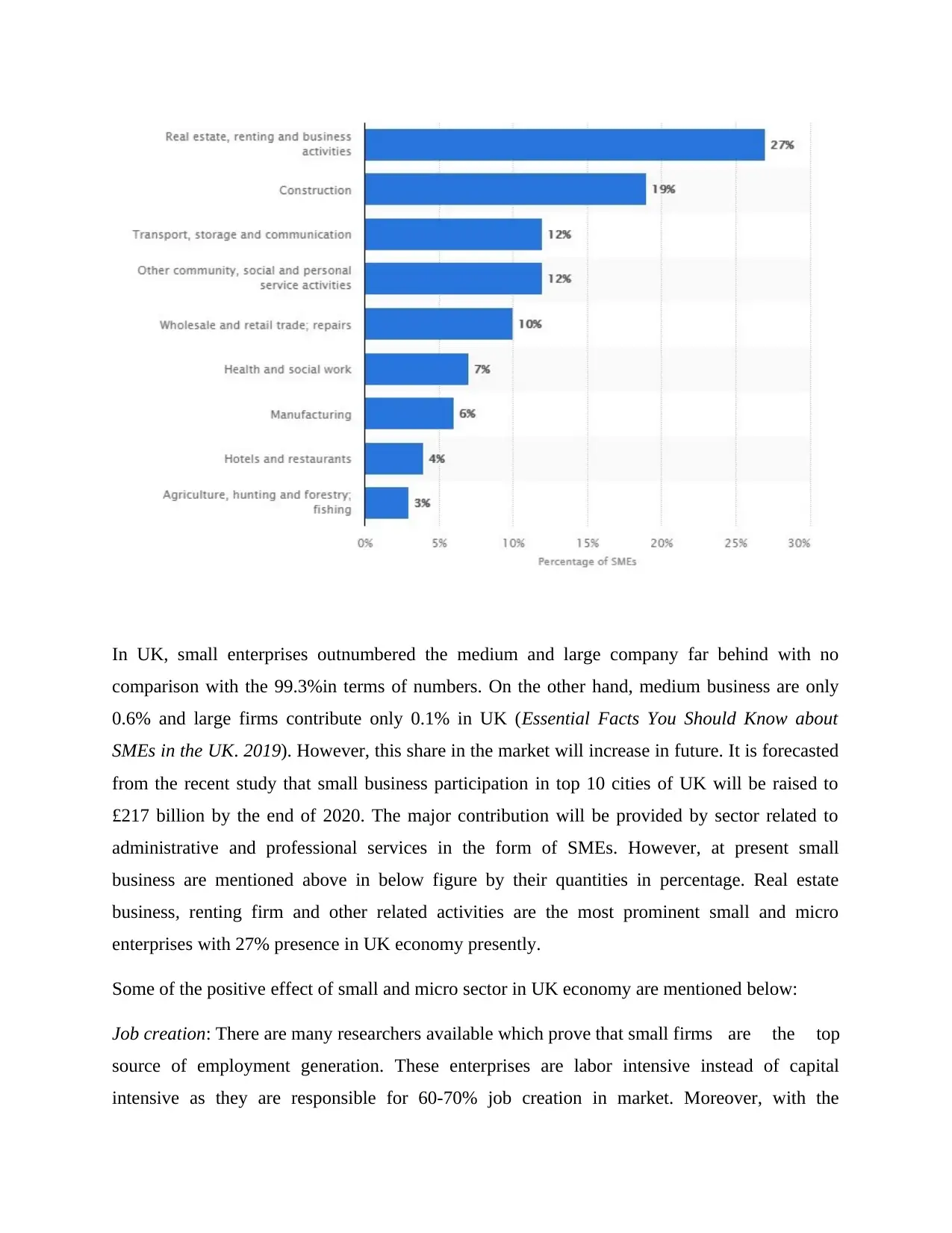
In UK, small enterprises outnumbered the medium and large company far behind with no
comparison with the 99.3%in terms of numbers. On the other hand, medium business are only
0.6% and large firms contribute only 0.1% in UK (Essential Facts You Should Know about
SMEs in the UK. 2019). However, this share in the market will increase in future. It is forecasted
from the recent study that small business participation in top 10 cities of UK will be raised to
£217 billion by the end of 2020. The major contribution will be provided by sector related to
administrative and professional services in the form of SMEs. However, at present small
business are mentioned above in below figure by their quantities in percentage. Real estate
business, renting firm and other related activities are the most prominent small and micro
enterprises with 27% presence in UK economy presently.
Some of the positive effect of small and micro sector in UK economy are mentioned below:
Job creation: There are many researchers available which prove that small firms are the top
source of employment generation. These enterprises are labor intensive instead of capital
intensive as they are responsible for 60-70% job creation in market. Moreover, with the
comparison with the 99.3%in terms of numbers. On the other hand, medium business are only
0.6% and large firms contribute only 0.1% in UK (Essential Facts You Should Know about
SMEs in the UK. 2019). However, this share in the market will increase in future. It is forecasted
from the recent study that small business participation in top 10 cities of UK will be raised to
£217 billion by the end of 2020. The major contribution will be provided by sector related to
administrative and professional services in the form of SMEs. However, at present small
business are mentioned above in below figure by their quantities in percentage. Real estate
business, renting firm and other related activities are the most prominent small and micro
enterprises with 27% presence in UK economy presently.
Some of the positive effect of small and micro sector in UK economy are mentioned below:
Job creation: There are many researchers available which prove that small firms are the top
source of employment generation. These enterprises are labor intensive instead of capital
intensive as they are responsible for 60-70% job creation in market. Moreover, with the
Paraphrase This Document
Need a fresh take? Get an instant paraphrase of this document with our AI Paraphraser
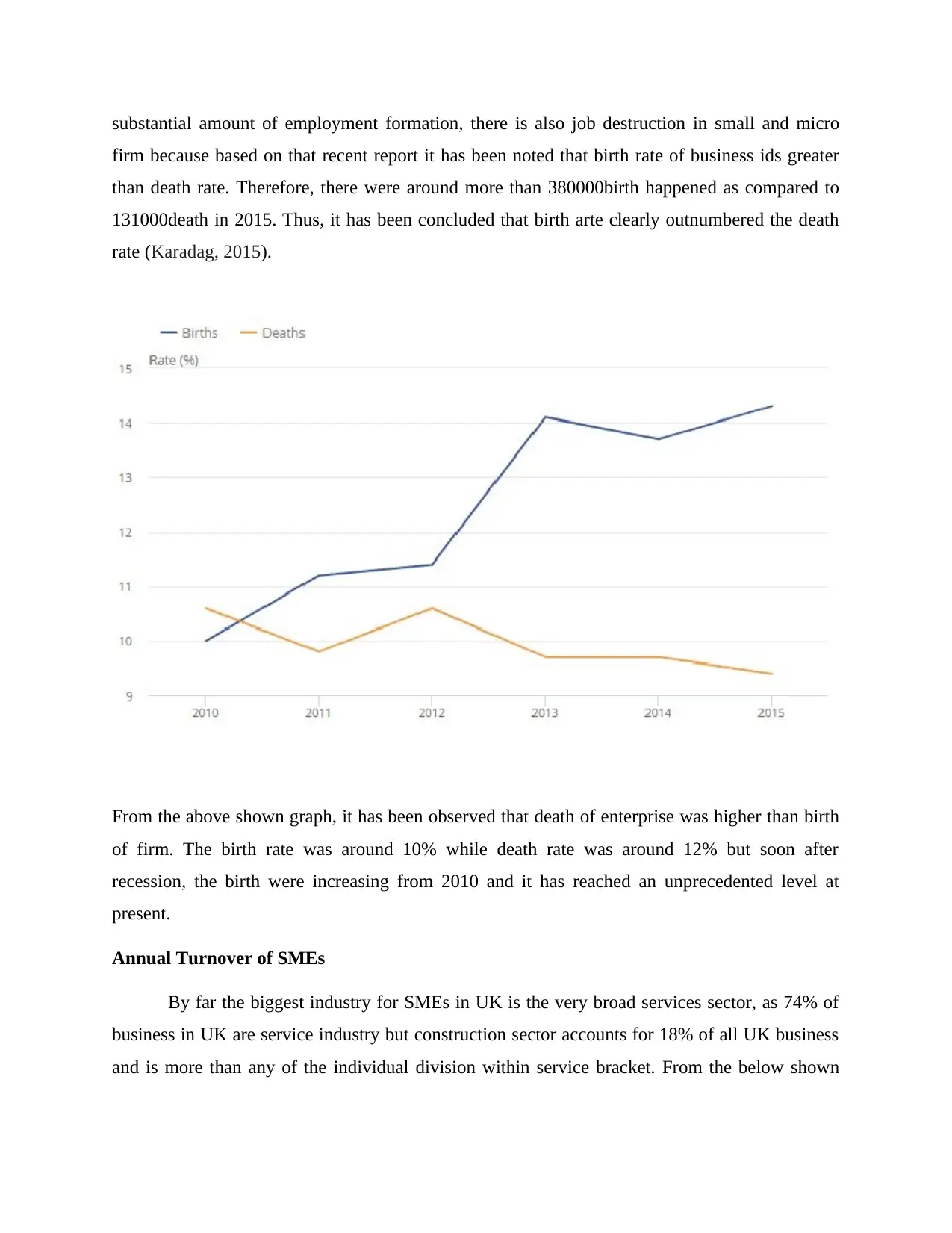
substantial amount of employment formation, there is also job destruction in small and micro
firm because based on that recent report it has been noted that birth rate of business ids greater
than death rate. Therefore, there were around more than 380000birth happened as compared to
131000death in 2015. Thus, it has been concluded that birth arte clearly outnumbered the death
rate (Karadag, 2015).
From the above shown graph, it has been observed that death of enterprise was higher than birth
of firm. The birth rate was around 10% while death rate was around 12% but soon after
recession, the birth were increasing from 2010 and it has reached an unprecedented level at
present.
Annual Turnover of SMEs
By far the biggest industry for SMEs in UK is the very broad services sector, as 74% of
business in UK are service industry but construction sector accounts for 18% of all UK business
and is more than any of the individual division within service bracket. From the below shown
firm because based on that recent report it has been noted that birth rate of business ids greater
than death rate. Therefore, there were around more than 380000birth happened as compared to
131000death in 2015. Thus, it has been concluded that birth arte clearly outnumbered the death
rate (Karadag, 2015).
From the above shown graph, it has been observed that death of enterprise was higher than birth
of firm. The birth rate was around 10% while death rate was around 12% but soon after
recession, the birth were increasing from 2010 and it has reached an unprecedented level at
present.
Annual Turnover of SMEs
By far the biggest industry for SMEs in UK is the very broad services sector, as 74% of
business in UK are service industry but construction sector accounts for 18% of all UK business
and is more than any of the individual division within service bracket. From the below shown
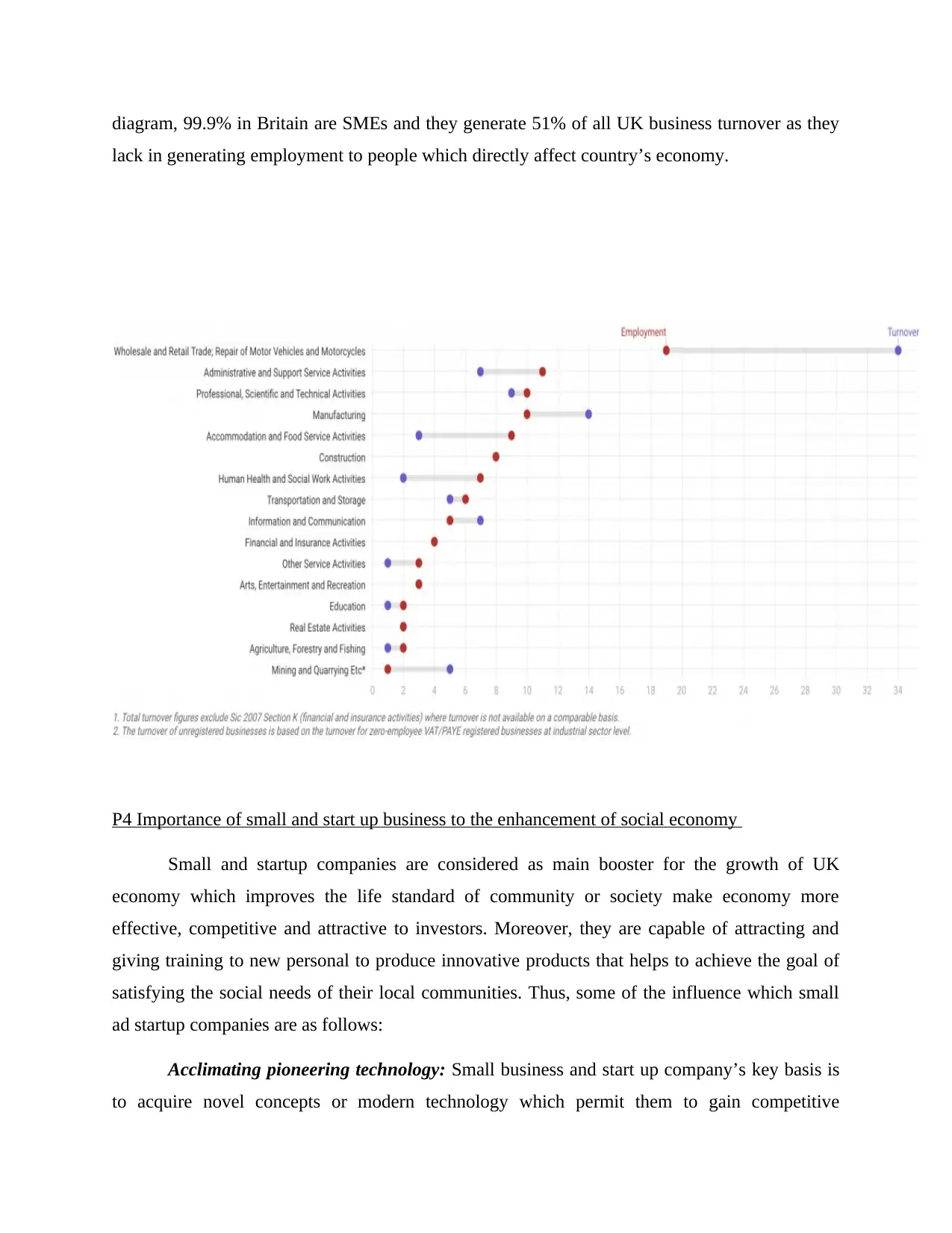
diagram, 99.9% in Britain are SMEs and they generate 51% of all UK business turnover as they
lack in generating employment to people which directly affect country’s economy.
P4 Importance of small and start up business to the enhancement of social economy
Small and startup companies are considered as main booster for the growth of UK
economy which improves the life standard of community or society make economy more
effective, competitive and attractive to investors. Moreover, they are capable of attracting and
giving training to new personal to produce innovative products that helps to achieve the goal of
satisfying the social needs of their local communities. Thus, some of the influence which small
ad startup companies are as follows:
Acclimating pioneering technology: Small business and start up company’s key basis is
to acquire novel concepts or modern technology which permit them to gain competitive
lack in generating employment to people which directly affect country’s economy.
P4 Importance of small and start up business to the enhancement of social economy
Small and startup companies are considered as main booster for the growth of UK
economy which improves the life standard of community or society make economy more
effective, competitive and attractive to investors. Moreover, they are capable of attracting and
giving training to new personal to produce innovative products that helps to achieve the goal of
satisfying the social needs of their local communities. Thus, some of the influence which small
ad startup companies are as follows:
Acclimating pioneering technology: Small business and start up company’s key basis is
to acquire novel concepts or modern technology which permit them to gain competitive
⊘ This is a preview!⊘
Do you want full access?
Subscribe today to unlock all pages.

Trusted by 1+ million students worldwide
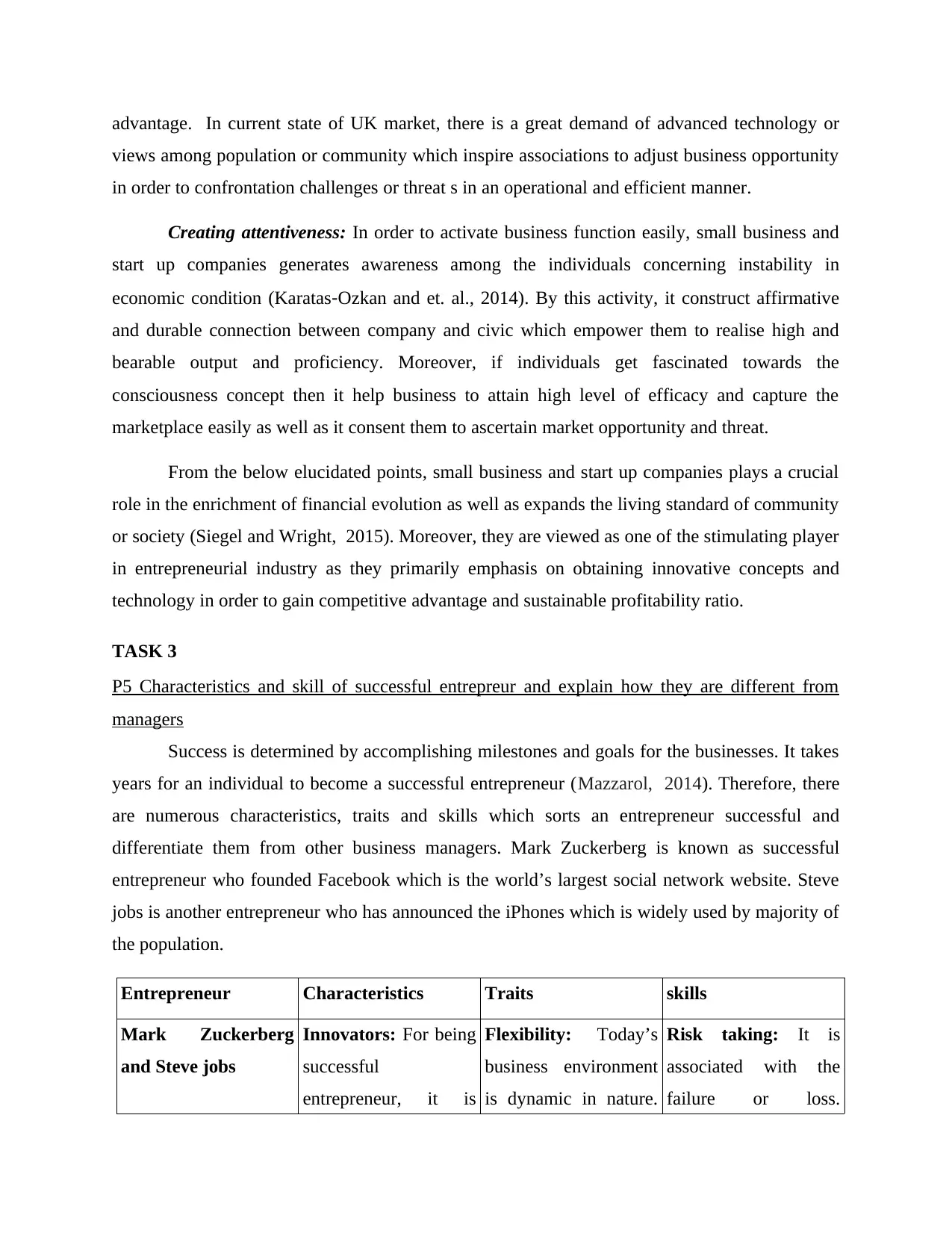
advantage. In current state of UK market, there is a great demand of advanced technology or
views among population or community which inspire associations to adjust business opportunity
in order to confrontation challenges or threat s in an operational and efficient manner.
Creating attentiveness: In order to activate business function easily, small business and
start up companies generates awareness among the individuals concerning instability in
economic condition (Karatas‐Ozkan and et. al., 2014). By this activity, it construct affirmative
and durable connection between company and civic which empower them to realise high and
bearable output and proficiency. Moreover, if individuals get fascinated towards the
consciousness concept then it help business to attain high level of efficacy and capture the
marketplace easily as well as it consent them to ascertain market opportunity and threat.
From the below elucidated points, small business and start up companies plays a crucial
role in the enrichment of financial evolution as well as expands the living standard of community
or society (Siegel and Wright, 2015). Moreover, they are viewed as one of the stimulating player
in entrepreneurial industry as they primarily emphasis on obtaining innovative concepts and
technology in order to gain competitive advantage and sustainable profitability ratio.
TASK 3
P5 Characteristics and skill of successful entrepreur and explain how they are different from
managers
Success is determined by accomplishing milestones and goals for the businesses. It takes
years for an individual to become a successful entrepreneur (Mazzarol, 2014). Therefore, there
are numerous characteristics, traits and skills which sorts an entrepreneur successful and
differentiate them from other business managers. Mark Zuckerberg is known as successful
entrepreneur who founded Facebook which is the world’s largest social network website. Steve
jobs is another entrepreneur who has announced the iPhones which is widely used by majority of
the population.
Entrepreneur Characteristics Traits skills
Mark Zuckerberg
and Steve jobs
Innovators: For being
successful
entrepreneur, it is
Flexibility: Today’s
business environment
is dynamic in nature.
Risk taking: It is
associated with the
failure or loss.
views among population or community which inspire associations to adjust business opportunity
in order to confrontation challenges or threat s in an operational and efficient manner.
Creating attentiveness: In order to activate business function easily, small business and
start up companies generates awareness among the individuals concerning instability in
economic condition (Karatas‐Ozkan and et. al., 2014). By this activity, it construct affirmative
and durable connection between company and civic which empower them to realise high and
bearable output and proficiency. Moreover, if individuals get fascinated towards the
consciousness concept then it help business to attain high level of efficacy and capture the
marketplace easily as well as it consent them to ascertain market opportunity and threat.
From the below elucidated points, small business and start up companies plays a crucial
role in the enrichment of financial evolution as well as expands the living standard of community
or society (Siegel and Wright, 2015). Moreover, they are viewed as one of the stimulating player
in entrepreneurial industry as they primarily emphasis on obtaining innovative concepts and
technology in order to gain competitive advantage and sustainable profitability ratio.
TASK 3
P5 Characteristics and skill of successful entrepreur and explain how they are different from
managers
Success is determined by accomplishing milestones and goals for the businesses. It takes
years for an individual to become a successful entrepreneur (Mazzarol, 2014). Therefore, there
are numerous characteristics, traits and skills which sorts an entrepreneur successful and
differentiate them from other business managers. Mark Zuckerberg is known as successful
entrepreneur who founded Facebook which is the world’s largest social network website. Steve
jobs is another entrepreneur who has announced the iPhones which is widely used by majority of
the population.
Entrepreneur Characteristics Traits skills
Mark Zuckerberg
and Steve jobs
Innovators: For being
successful
entrepreneur, it is
Flexibility: Today’s
business environment
is dynamic in nature.
Risk taking: It is
associated with the
failure or loss.
Paraphrase This Document
Need a fresh take? Get an instant paraphrase of this document with our AI Paraphraser
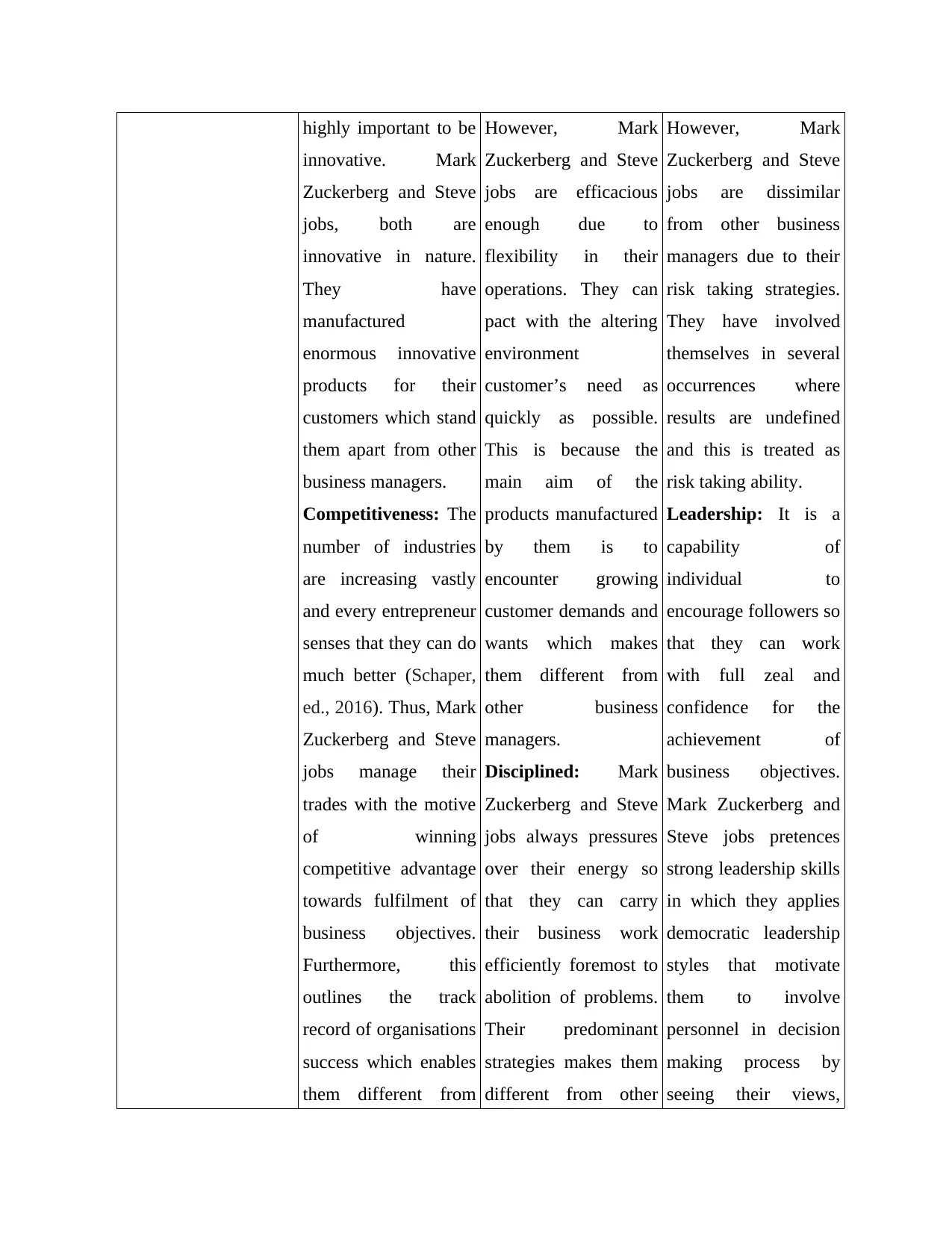
highly important to be
innovative. Mark
Zuckerberg and Steve
jobs, both are
innovative in nature.
They have
manufactured
enormous innovative
products for their
customers which stand
them apart from other
business managers.
Competitiveness: The
number of industries
are increasing vastly
and every entrepreneur
senses that they can do
much better (Schaper,
ed., 2016). Thus, Mark
Zuckerberg and Steve
jobs manage their
trades with the motive
of winning
competitive advantage
towards fulfilment of
business objectives.
Furthermore, this
outlines the track
record of organisations
success which enables
them different from
However, Mark
Zuckerberg and Steve
jobs are efficacious
enough due to
flexibility in their
operations. They can
pact with the altering
environment
customer’s need as
quickly as possible.
This is because the
main aim of the
products manufactured
by them is to
encounter growing
customer demands and
wants which makes
them different from
other business
managers.
Disciplined: Mark
Zuckerberg and Steve
jobs always pressures
over their energy so
that they can carry
their business work
efficiently foremost to
abolition of problems.
Their predominant
strategies makes them
different from other
However, Mark
Zuckerberg and Steve
jobs are dissimilar
from other business
managers due to their
risk taking strategies.
They have involved
themselves in several
occurrences where
results are undefined
and this is treated as
risk taking ability.
Leadership: It is a
capability of
individual to
encourage followers so
that they can work
with full zeal and
confidence for the
achievement of
business objectives.
Mark Zuckerberg and
Steve jobs pretences
strong leadership skills
in which they applies
democratic leadership
styles that motivate
them to involve
personnel in decision
making process by
seeing their views,
innovative. Mark
Zuckerberg and Steve
jobs, both are
innovative in nature.
They have
manufactured
enormous innovative
products for their
customers which stand
them apart from other
business managers.
Competitiveness: The
number of industries
are increasing vastly
and every entrepreneur
senses that they can do
much better (Schaper,
ed., 2016). Thus, Mark
Zuckerberg and Steve
jobs manage their
trades with the motive
of winning
competitive advantage
towards fulfilment of
business objectives.
Furthermore, this
outlines the track
record of organisations
success which enables
them different from
However, Mark
Zuckerberg and Steve
jobs are efficacious
enough due to
flexibility in their
operations. They can
pact with the altering
environment
customer’s need as
quickly as possible.
This is because the
main aim of the
products manufactured
by them is to
encounter growing
customer demands and
wants which makes
them different from
other business
managers.
Disciplined: Mark
Zuckerberg and Steve
jobs always pressures
over their energy so
that they can carry
their business work
efficiently foremost to
abolition of problems.
Their predominant
strategies makes them
different from other
However, Mark
Zuckerberg and Steve
jobs are dissimilar
from other business
managers due to their
risk taking strategies.
They have involved
themselves in several
occurrences where
results are undefined
and this is treated as
risk taking ability.
Leadership: It is a
capability of
individual to
encourage followers so
that they can work
with full zeal and
confidence for the
achievement of
business objectives.
Mark Zuckerberg and
Steve jobs pretences
strong leadership skills
in which they applies
democratic leadership
styles that motivate
them to involve
personnel in decision
making process by
seeing their views,
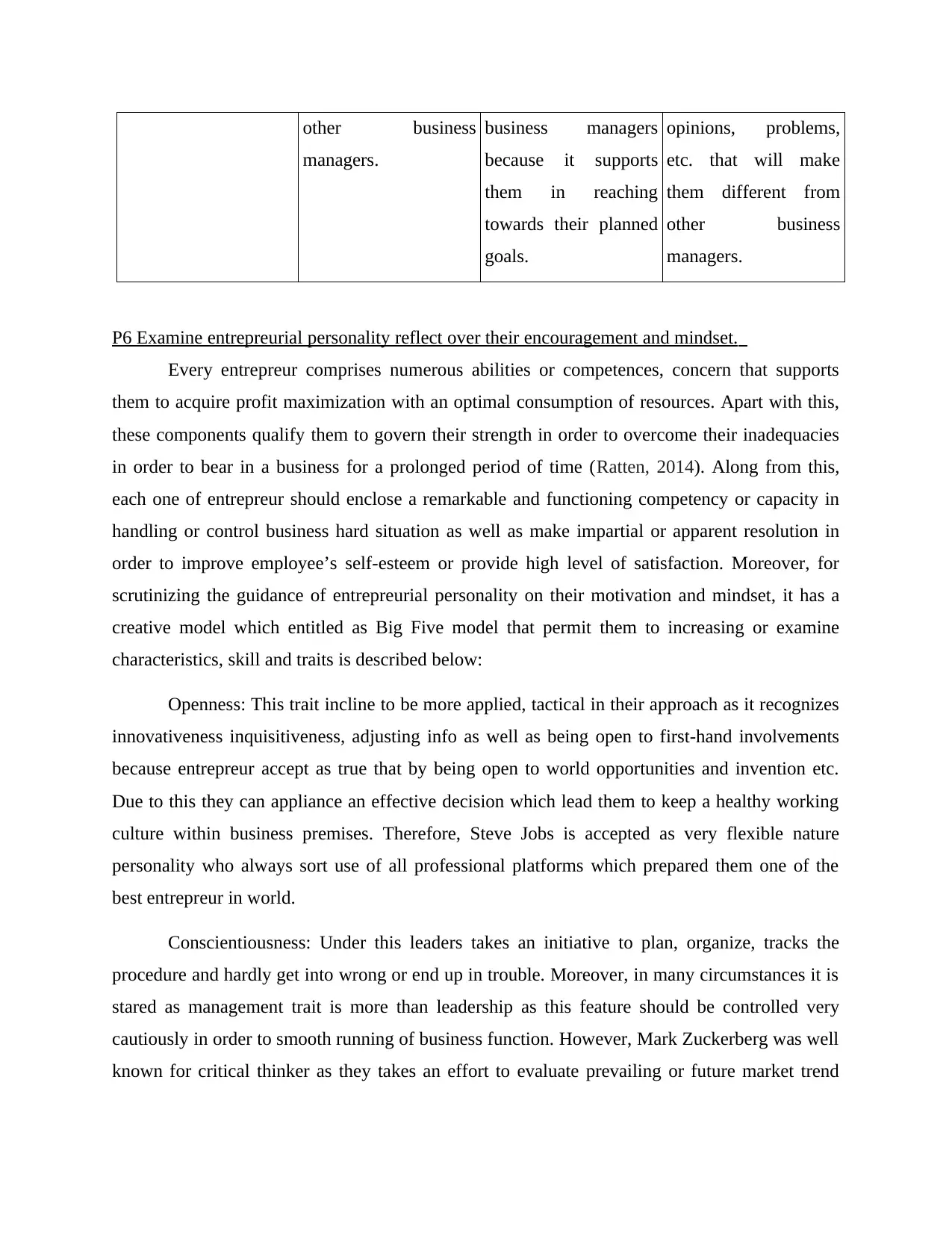
other business
managers.
business managers
because it supports
them in reaching
towards their planned
goals.
opinions, problems,
etc. that will make
them different from
other business
managers.
P6 Examine entrepreurial personality reflect over their encouragement and mindset.
Every entrepreur comprises numerous abilities or competences, concern that supports
them to acquire profit maximization with an optimal consumption of resources. Apart with this,
these components qualify them to govern their strength in order to overcome their inadequacies
in order to bear in a business for a prolonged period of time (Ratten, 2014). Along from this,
each one of entrepreur should enclose a remarkable and functioning competency or capacity in
handling or control business hard situation as well as make impartial or apparent resolution in
order to improve employee’s self-esteem or provide high level of satisfaction. Moreover, for
scrutinizing the guidance of entrepreurial personality on their motivation and mindset, it has a
creative model which entitled as Big Five model that permit them to increasing or examine
characteristics, skill and traits is described below:
Openness: This trait incline to be more applied, tactical in their approach as it recognizes
innovativeness inquisitiveness, adjusting info as well as being open to first-hand involvements
because entrepreur accept as true that by being open to world opportunities and invention etc.
Due to this they can appliance an effective decision which lead them to keep a healthy working
culture within business premises. Therefore, Steve Jobs is accepted as very flexible nature
personality who always sort use of all professional platforms which prepared them one of the
best entrepreur in world.
Conscientiousness: Under this leaders takes an initiative to plan, organize, tracks the
procedure and hardly get into wrong or end up in trouble. Moreover, in many circumstances it is
stared as management trait is more than leadership as this feature should be controlled very
cautiously in order to smooth running of business function. However, Mark Zuckerberg was well
known for critical thinker as they takes an effort to evaluate prevailing or future market trend
managers.
business managers
because it supports
them in reaching
towards their planned
goals.
opinions, problems,
etc. that will make
them different from
other business
managers.
P6 Examine entrepreurial personality reflect over their encouragement and mindset.
Every entrepreur comprises numerous abilities or competences, concern that supports
them to acquire profit maximization with an optimal consumption of resources. Apart with this,
these components qualify them to govern their strength in order to overcome their inadequacies
in order to bear in a business for a prolonged period of time (Ratten, 2014). Along from this,
each one of entrepreur should enclose a remarkable and functioning competency or capacity in
handling or control business hard situation as well as make impartial or apparent resolution in
order to improve employee’s self-esteem or provide high level of satisfaction. Moreover, for
scrutinizing the guidance of entrepreurial personality on their motivation and mindset, it has a
creative model which entitled as Big Five model that permit them to increasing or examine
characteristics, skill and traits is described below:
Openness: This trait incline to be more applied, tactical in their approach as it recognizes
innovativeness inquisitiveness, adjusting info as well as being open to first-hand involvements
because entrepreur accept as true that by being open to world opportunities and invention etc.
Due to this they can appliance an effective decision which lead them to keep a healthy working
culture within business premises. Therefore, Steve Jobs is accepted as very flexible nature
personality who always sort use of all professional platforms which prepared them one of the
best entrepreur in world.
Conscientiousness: Under this leaders takes an initiative to plan, organize, tracks the
procedure and hardly get into wrong or end up in trouble. Moreover, in many circumstances it is
stared as management trait is more than leadership as this feature should be controlled very
cautiously in order to smooth running of business function. However, Mark Zuckerberg was well
known for critical thinker as they takes an effort to evaluate prevailing or future market trend
⊘ This is a preview!⊘
Do you want full access?
Subscribe today to unlock all pages.

Trusted by 1+ million students worldwide
1 out of 16
Related Documents
Your All-in-One AI-Powered Toolkit for Academic Success.
+13062052269
info@desklib.com
Available 24*7 on WhatsApp / Email
![[object Object]](/_next/static/media/star-bottom.7253800d.svg)
Unlock your academic potential
Copyright © 2020–2026 A2Z Services. All Rights Reserved. Developed and managed by ZUCOL.





